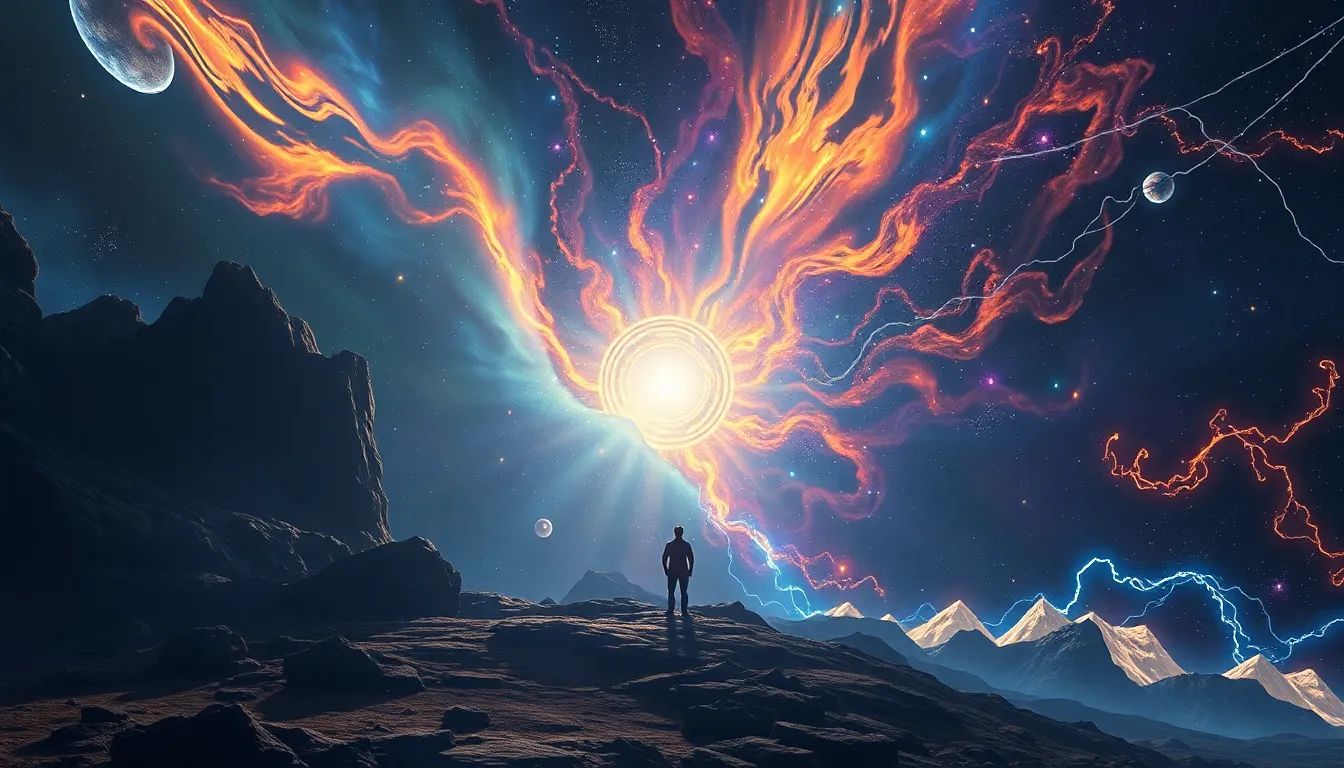The Great Cosmic Story: How Myths Explain Our Existence
I. Introduction: The Intersection of Myth and Existence
Myths have been an integral part of human culture since the dawn of civilization. They are more than mere stories; they are the vessels through which societies convey their beliefs, values, and understanding of the world. Myths serve as a lens through which we can explore profound questions about our existence, our origins, and our place in the universe.
This article delves into the nature of myths, their role in shaping human understanding, and their continued relevance in the modern world. We will explore how myths reflect collective human experiences, their cosmological implications, and their intersection with science, culture, and personal identity.
II. The Nature of Myths: More Than Just Stories
Myths possess several defining characteristics that transcend cultural boundaries:
- Universal Themes: Myths often address fundamental human concerns such as creation, destruction, love, and morality.
- Symbolism: They utilize symbols and metaphors to convey complex ideas in a relatable manner.
- Oral Tradition: Many myths were passed down orally, evolving with each retelling, which emphasizes their dynamic nature.
Psychologically, myths serve several functions:
- They provide frameworks for understanding the world and our experiences.
- They foster social cohesion by establishing shared beliefs and values.
- They offer comfort in times of uncertainty, providing narratives that explain the inexplicable.
Collectively, myths reflect the human experience, encapsulating the trials and triumphs of humanity across generations.
III. Cosmology in Myth: How Myths Shape Our Understanding of the Universe
Creation myths are particularly fascinating as they offer diverse narratives about the origin of the universe. These stories vary significantly across cultures:
- Genesis in Judeo-Christian Tradition: The story of creation in six days, culminating in the creation of humanity.
- Hindu Cosmology: The cyclical nature of creation, preservation, and destruction represented by the deities Brahma, Vishnu, and Shiva.
- Maori Mythology: The separation of Rangi (Sky Father) and Papa (Earth Mother) to create the world.
In these myths, deities and supernatural beings play pivotal roles, often embodying natural forces and human traits. A comparative analysis reveals common themes, such as the struggle between chaos and order, and the anthropomorphizing of nature.
IV. Myths and Human Existence: Exploring the Human Condition
Myths often grapple with profound questions surrounding life, death, and rebirth. They encompass narratives that explore:
- The Cycle of Life: Stories that illustrate the inevitability of death and the possibility of rebirth, such as the myth of Persephone.
- Heroic Journeys: The archetypal hero’s journey found in tales like those of Odysseus or King Arthur, emphasizing personal growth through trials.
- Moral Lessons: Virtues and vices are often personified in myths, teaching ethical frameworks that guide human behavior.
V. Myths and Science: Convergence and Divergence
Historically, myths and scientific understanding have often been at odds. However, they also share a symbiotic relationship:
- Influence on Science: Myths have inspired scientific inquiry, as early scientists sought to understand the world in ways that echoed mythological narratives.
- Myths as Metaphors: Some scientific concepts, like the Big Bang, can be likened to creation myths in their attempts to explain the universe’s origins.
- Contemporary Dialogue: Modern scientists and mythologists engage in discussions about the implications of their fields, exploring how each can inform the other.
VI. The Power of Storytelling: Myths as Tools for Cultural Identity
Myths play a crucial role in shaping national and cultural identities. They serve as a repository of shared beliefs and historical narratives:
- National Myths: Stories that forge a sense of unity and identity, such as the American Dream or the founding myths of nations.
- Generational Transmission: Myths are passed down through storytelling, ensuring cultural continuity.
- Community Values: By embodying collective values, myths help to reinforce societal norms and ethical behavior.
VII. Myths in the Modern World: Relevance and Adaptation
In contemporary culture, ancient myths are experiencing a resurgence:
- Literature and Film: Myths are frequently reinterpreted in modern storytelling, from blockbuster movies to bestselling novels.
- Popular Media: Myths influence video games, comics, and other forms of entertainment, shaping the narratives we engage with daily.
- Worldview Impact: Modern adaptations of myths continue to shape our understanding of morality, heroism, and the human experience.
VIII. Personal Myths: Individual Narratives and Their Impact
The concept of personal mythology in psychology emphasizes the importance of individual narratives:
- Self-Identity: Individuals create personal myths that help define who they are and their place in the world.
- Reshaping Narratives: People often revise their myths in response to life experiences, allowing for personal growth.
- Therapeutic Role: Personal narratives can be therapeutic, helping individuals understand their past and envision their future.
IX. The Future of Myths: Evolution in a Changing World
As we move further into the 21st century, the landscape of myth-making is evolving:
- Globalization: The interconnectedness of cultures is leading to the blending of myths, creating new narratives that reflect a shared global experience.
- Emerging Myths: Contemporary issues, such as climate change and technology, may spawn new myths that address the challenges of our time.
- Preservation of Myths: It is essential to keep myths alive for future generations, as they provide invaluable insights into human existence and cultural heritage.



